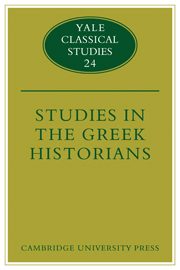Book contents
- Frontmatter
- Contents
- Preface
- In Memoriam Adam and Anne Parry
- Learning through suffering? Croesus' conversations in the history of Herodotus
- An Athenian generation gap
- Thucydides' judgment of Periclean strategy
- The speeches in Thucydides and the Mytilene debate
- Xenophon, Diodorus and the year 379/378 B.C. Reconstruction and reappraisal
- Aristotle's Athenaion Politeia and the establishment of the Thirty Tyrants
- Nearchus the Cretan
- Myth and archaeologia in Italy and Sicily – Timaeus and his predecessors
- Symploke: its role in Polybius' Histories
- Plutarch and the Megarian decree
- Herodian and Elagabalus
Plutarch and the Megarian decree
Published online by Cambridge University Press: 06 December 2010
- Frontmatter
- Contents
- Preface
- In Memoriam Adam and Anne Parry
- Learning through suffering? Croesus' conversations in the history of Herodotus
- An Athenian generation gap
- Thucydides' judgment of Periclean strategy
- The speeches in Thucydides and the Mytilene debate
- Xenophon, Diodorus and the year 379/378 B.C. Reconstruction and reappraisal
- Aristotle's Athenaion Politeia and the establishment of the Thirty Tyrants
- Nearchus the Cretan
- Myth and archaeologia in Italy and Sicily – Timaeus and his predecessors
- Symploke: its role in Polybius' Histories
- Plutarch and the Megarian decree
- Herodian and Elagabalus
Summary
The megarian degree, with its context of associated events, the violation of the hiera orgas, Anthemocritus' embassy and the decree of Charinus, has prompted considerable discussion in recent years. The possibility of reconciling the evidence of our three main witnesses, Thucydides, Aristophanes and Plutarch, would be difficult even if it were not compounded by difficulties in the interpretation of each of them. Thus the mere determination of the date of the central decree – that banning the Megarians from the Athenian agora and the harbors of the allied cities – cannot be disentangled from the literary and philosophical problem of judging Thucydides' version of the causes or occasions of the Peloponnesian War. Brunt could argue, for example, that Thucydides' failure to inform us when or why the Megarian decree was passed is presumptive evidence that it was not a preliminary of the War and that it therefore must have been voted substantially before 433 or 432. Ignoring for the present the possibility that Thucydides did not know that he did not tell us its date, Brunt's judgment is clearly based upon his general assessment of Thucydides' mode of operation. Working from a different assessment, Meiggs could as reasonably conclude that the reason Thucydides makes so little of the decree is that others had made so much of it. He did not tell us simply because he refused to count it among the αἰτίαι and διαϕοραί and, as Jacoby would say, was being stiff-necked about the whole matter.
- Type
- Chapter
- Information
- Studies in the Greek Historians , pp. 213 - 228Publisher: Cambridge University PressPrint publication year: 1975
- 1
- Cited by



